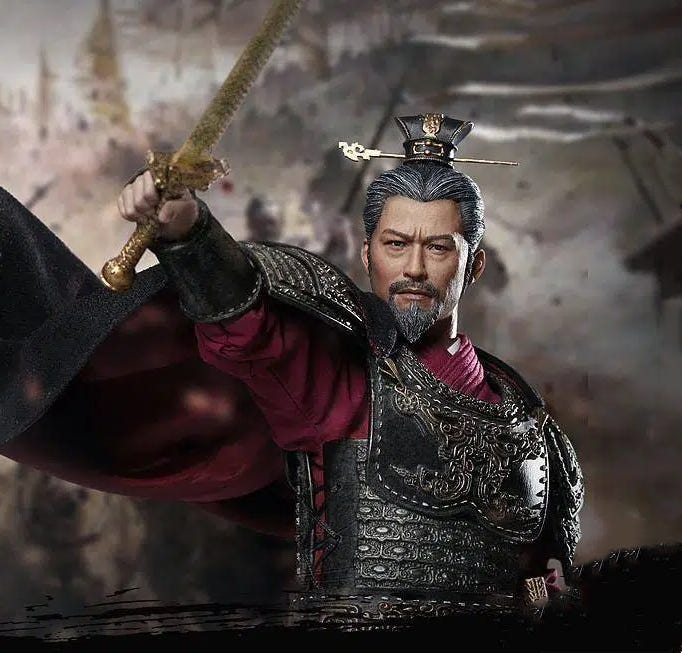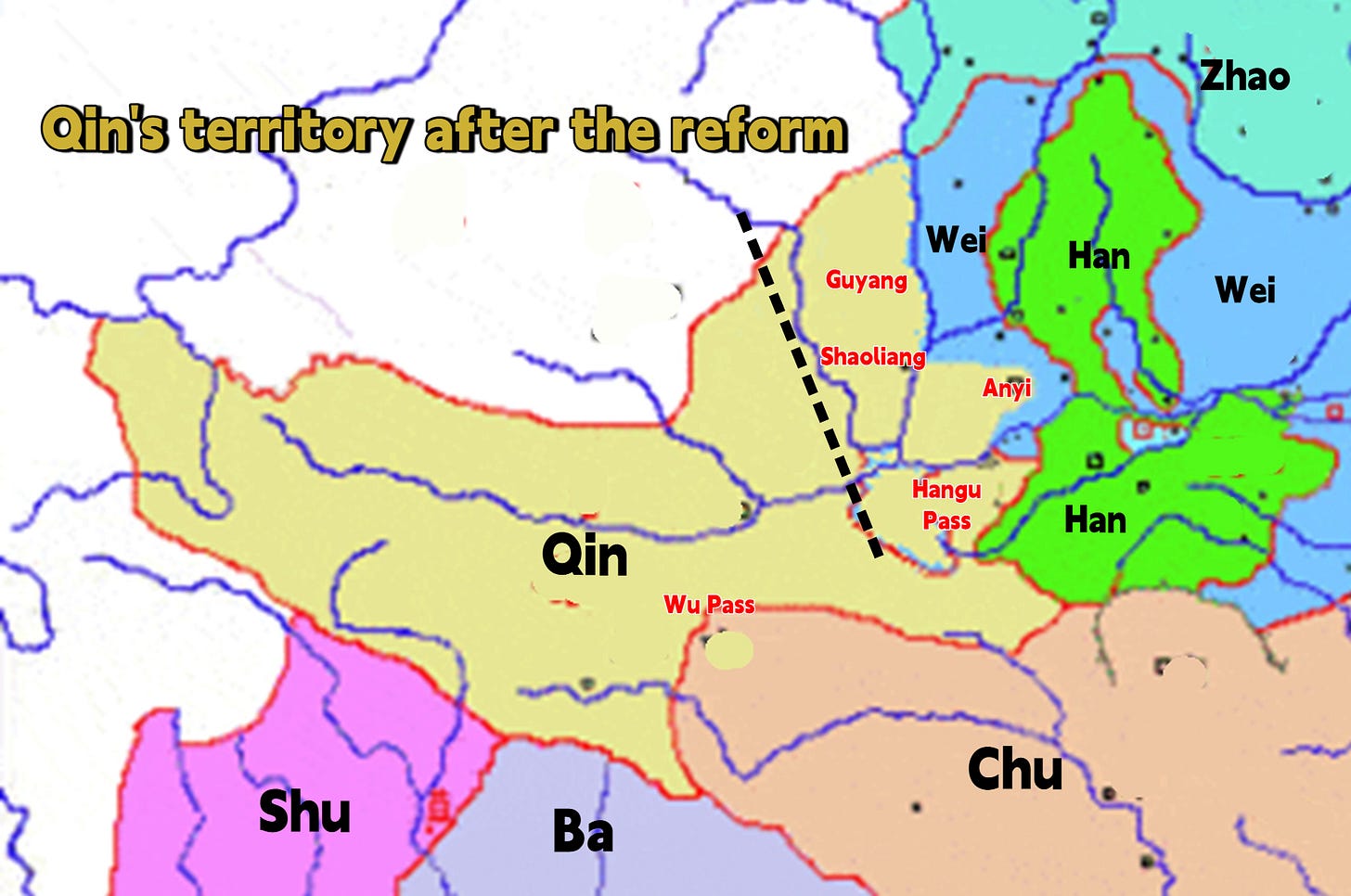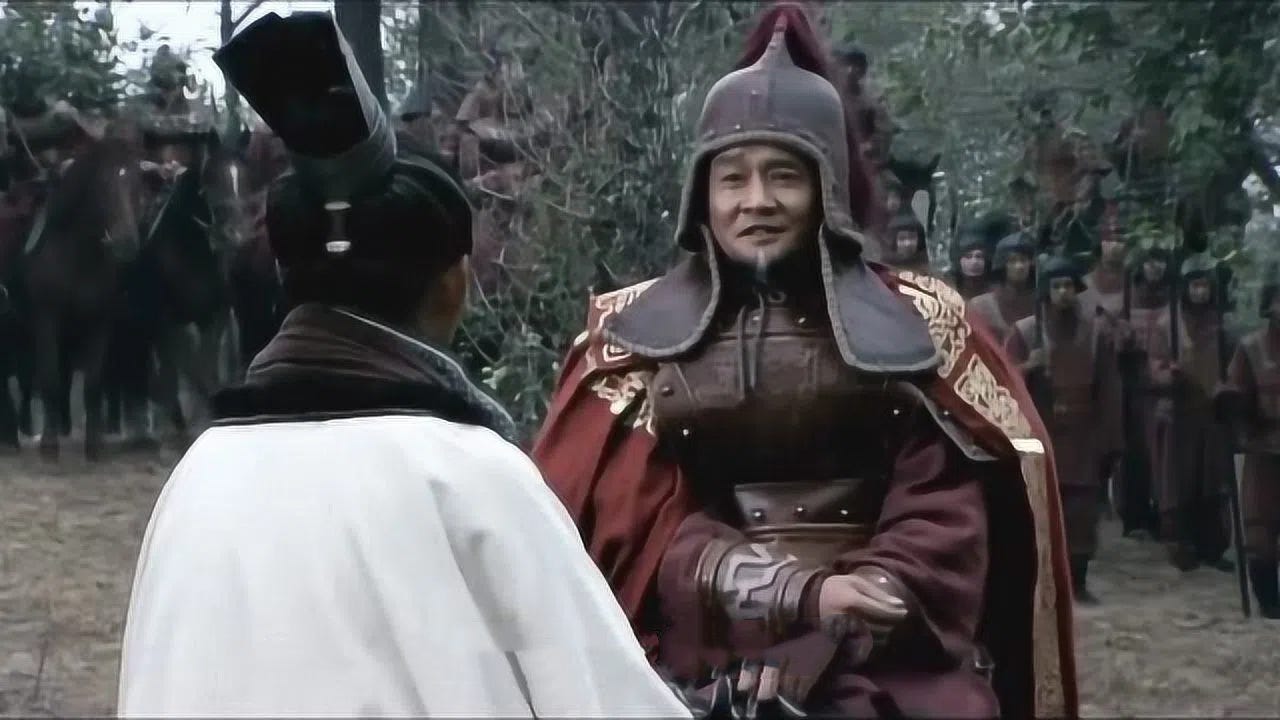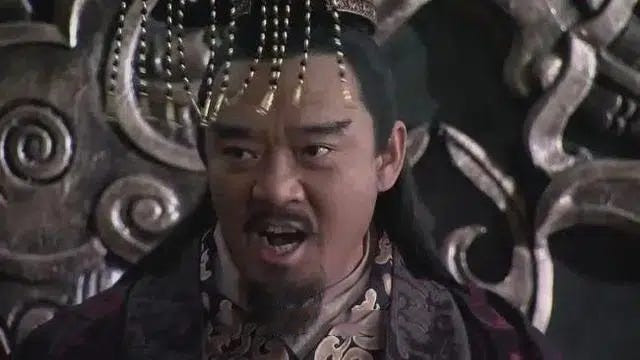How effective were Shang Yang's Reforms, and what led to their success?(Warring States 15)
Volume 3 - The Reforms of Shang Yang V
Previous Chapter :How did the Great Qin forge its "Wolf-Warrior" Army?(Warring State 14)
History of Warring States Period(Catalog)
Let’s examine the military achievements after Shang Yang’s reform
4th year of Duke Xiao of Qin (377BC): Qin defeated the Han韩 army at Xishan西山
8th year of Duke Xiao of Qin (373BC):
Captured Shaoliang少梁 from Wei魏.
Seized Anling 安陵 and Shanshi 山氏 from Han, piercing the Wei-Han border region.
10th year of Duke Xiao of Qin (371BC): Laid siege to Anyi 安邑, the former capital of Wei.
11th year of Duke Xiao of Qin (370BC):
Captured Guyang 固阳, Wei’s most critical northwestern stronghold.
Constructed Wu Pass武关, one of the Four Strategic Passes of Guanzhong关中 and the essential choke point between Qin and Chu楚.
19th year of Duke Xiao of Qin (362BC): King Xian of Zhou (周显王, 41st ruler of the Zhou Dynasty) formally recognized Duke Xiao as "Leader of the Western States’ Alliance" . This erased the humiliation of Qin’s earlier exclusion from interstate conferences.
Gongsun Yang (Shang Yang) was not only adept at civilian governance but also skilled in military command, personally leading campaigns on multiple fronts.
For instance:
The siege of Anyi in Duke Xiao’s 10th year(371BC).
The western capture of Guyang in his 11th year(370BC).
Both were masterstrokes of his own planning.
In summary, Gongsun Yang was a polymath—but his legacy demands a more nuanced assessment.
Sima Qian (司马迁), author of Records of the Grand Historian (史记), evaluated him thus:
"Shang Yang was inherently ruthless by nature."
"He lacked empathy—a man of scant compassion."
"Having studied his writings and observed his conduct, his eventual infamy in Qin was no accident."
A diplomatic critique—focused not on his reforms, but his character.
"Brilliant yet morally bankrupt" became the defining paradox of his life.
Whether dealing with:
Commoners,
Peers, or
Enemies,
his ruthless consequentialism justified any means to an end.
His final major victory epitomized this depravity.
22nd Year of Duke Xiao of Qin (秦孝公二十二年): Shang Yang Launched an Attack on Wei.
The previous year, Wei had suffered a catastrophic defeat at Maling (马陵). Seizing the opportunity, Shang Yang advised Duke Xiao:
"Strike while the enemy is weak—plunder before they recover."
Duke Xiao agreed and mobilized troops, with Shang Yang as commander-in-chief.
Wei sent Prince Ang (公子卬) to lead their forces.
Shang Yang and Prince Ang were old friends, having served together under Wei’s former chancellor, Gongshu Cuo (公叔痤).
Seeing an opening, Shang Yang sent a letter to Prince Ang:
"In Wei, we were friends! Now we stand as opposing generals. Though my lord commands this war, my heart rebels against it. Let us negotiate peace, toast to friendship, and withdraw our armies—wouldn’t that be ideal?"
Had Prince Ang reflected on who had spearheaded the recent seizures of Wei’s western territories, he might’ve recognized Shang Yang’s treachery. Moreover, Qin’s troops wouldn’t return empty-handed—they demanded heads and victories.
Yet Prince Ang agreed to meet.
Why? The Weight of Honor in the Warring States Era:
Though ritual propriety had eroded, trust was as sacred as property is today.
A noble’s word was binding without contracts—"one word, one nail" .
Deception in battle? Acceptable. But breaching diplomatic trust? Unthinkable.
Shang Yang, however, had no such scruples.
To him, nothing was sacred—every principle was a tool.
Just think about the “Red Wedding”.
At the meeting, the two clasped arms, swore oaths to heaven, and pledged eternal brotherhood between their states.
Then, Shang Yang’s hidden soldiers ambushed Prince Ang, taking him hostage.
Qin’s commandos infiltrated Prince Ang’s returning escort, while the main army followed covertly.
When Wei’s garrison saw their own troops returning, they lowered their guard—until Qin’s commandos began slaughtering them. Chaos ensued, and Qin’s army crushed Wei’s forces.
Aftermath:
King Hui of Wei (魏惠王), upon hearing the news, was terrified.
He ceded all lands west of the Yellow River to sue for peace, lamenting:
"If only I’d listened to my late chancellor!"
"Who knew this bastard could wreak such havoc?"
But there were no second chances.
"You should’ve killed him when you had the opportunity."
From then on, the natural barrier of the Yellow River was shared between Qin and Wei.
For his military achievements, Shang Yang was enfeoffed with the territory of Shang (商地), henceforth known as Lord Shang —Gongsun Yang had become Shang Yang.
As the saying goes: "Retribution may be delayed, but never denied."
This Lord Shang didn’t enjoy his status for long—his time was up.





